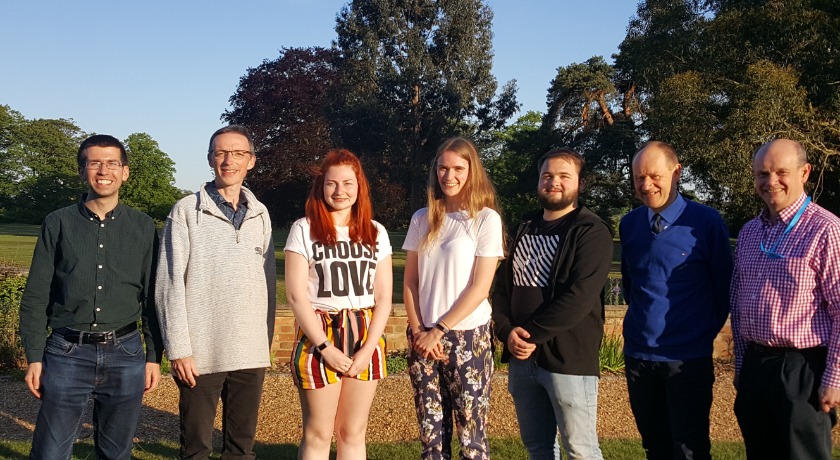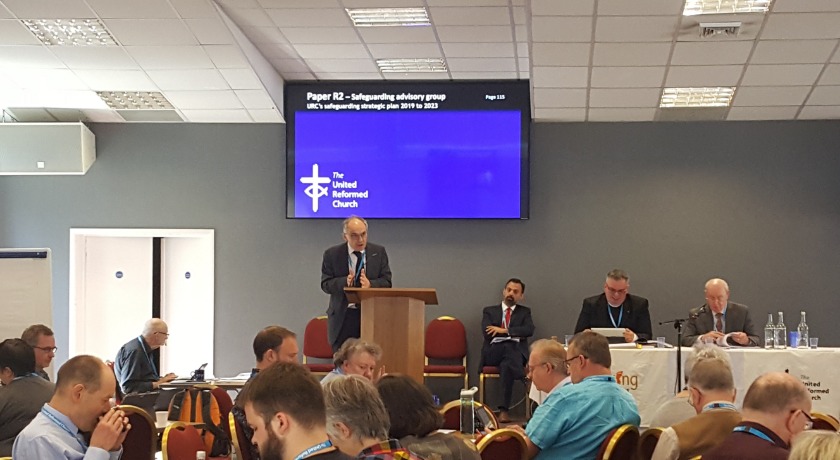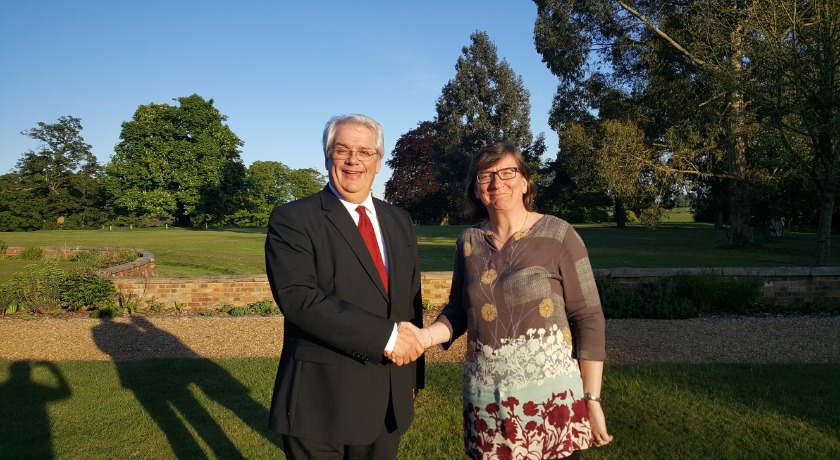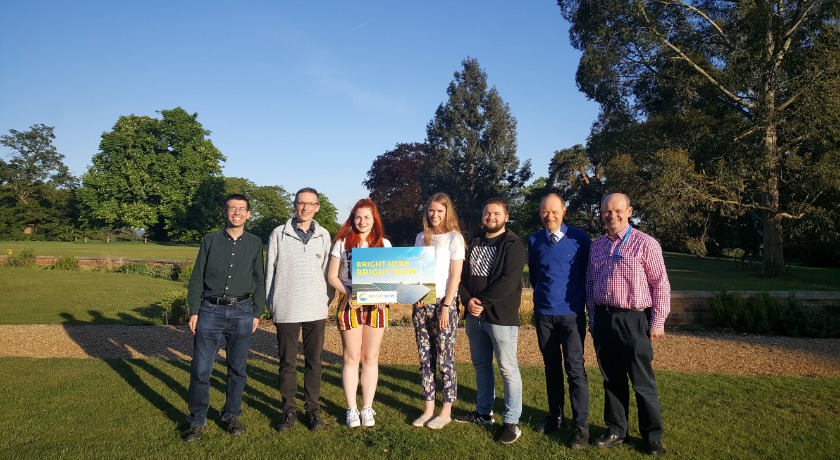 Day two of the spring meeting of Mission Council opened with worship. The theme of the Revd Neil Thorogood’s Tuesday morning Bible study was ‘listening to God speaking to us through each other.’
Day two of the spring meeting of Mission Council opened with worship. The theme of the Revd Neil Thorogood’s Tuesday morning Bible study was ‘listening to God speaking to us through each other.’
Using a reading from the Gospel of John about Jesus meeting a Samaritan woman at the well, along with the painting ‘Insight’ by German Catholic priest and artist, Sieger Köder (1925-2015), Mr Thorogood asked: ‘What have we heard through each other?’
He then shared his love of the Gospel of John saying: ‘It gives Jesus a cosmic context.’
Mr Thorogood, Principal of Westminster College, Cambridge, one of the URC’s Resource Centres for Learning, explained that what he felt was the most profound part of John 4:4–26, saying: ‘We can each bear witness to what we know to be encountered and to encounter the word made flesh. We can each put ourselves into Köder’s painting, look down and at our reflection in the well and see Jesus’ reflection looking back at us.
‘The encounter between the woman and Jesus turns to salvation and offers a larger understanding of the gift that is on offer – the gift of eternal life. We must ask: “As I listen to those I will encounter today, in what ways am I hearing the generous flow of the water of life? Also, what’s damming it up and what’s ignoring it?”
‘The woman is collecting water alone as she’s shunned by the community that collects water together. Despite this, Jesus loves her. In Jesus, the barriers tumble and fall and flee away.
‘And there is my hope. There is your hope. There is the hope of the world.’
Session four
Fossil fuels - Paper Z1: URC investment policy and Paper X1: Creating a climate of change – a new approach to ethical investment (continued from session three)
The Revd Nigel Uden reminded Mission Council where things left off in session three.
The Revd Dr David Pickering, Moderator of the URC National Synod of Scotland took to the podium. Answering questions about how URC trusts would be expected to respond to resolution X1, Dr Pickering said: ‘This is a matter where we are a competent body but cannot instruct our independent trustees what to do. They need to know our will and wishes and that’s what we are trying to convey to them.’
The Revd John Proctor, URC General Secretary, explained to Mission Council who the two national investment bodies were: The Ministers Pensions Fund (MPF), and the URC Trust. Mr Proctor said the MPF is always interested in the views and judgements of the central councils of the Church but that they are not bound to the decision these councils make. It is bound to law and its responsibility to the fund members. He added that the URC Trust, the second body, is also keen to be mindful of the wishes of the Council, but they are also not bound to the authority and direction of the Council. Mission Council can ask the two bodies to consider its will, but it cannot instruct them.
This led to a lively debate that explored the aims of the two papers: how critical success could be measured; how much influence a £100m investment gives the URC over a global company as large as Shell or Total and whether that percentage enables sufficient lobbying power against fossil fuels while encouraging a company to seek alternatives; what people can do in their daily lives to limit the demand for oil and gas so fossil fuel companies stop producing them; being a prophetic voice in the public sphere.
During this debate views for and against divestment were made.
One member said: ‘Engagement that delivers even small changes is better than divestment that achieves very little or nothing.’
Another said: ‘When I look at the resolutions, I can see the resolution in Paper X1 might help us to feel better about ourselves, but they do nothing to help the planet,’ adding that the resolution in Paper Z1 might not have the immediate impact of a moral crusade, but enables the URC to work with and join other denominations at the same juncture to push fossil fuel companies further towards alternatives forms of energy.
Natalie Gibbs, URC Youth Assembly Moderator, then made a statement on behalf of URC Youth Executive, which strongly supported Paper X1.
Natalie asked Mission Council: ‘Why as God’s people, stewards of his good creation, have we still not prevented or fixed the problem?’ She then referred to an Intergovernmental Panel on Climate Change (IPCC) report saying: ‘In just 40 years’ time the planet will no longer be able to cope with the effects of climate change … [things] would have spiralled out of control.
‘Our youngest member of URC Youth Executive will be just 59 when this occurs. This means it will be URC Youth members that have to live through and deal with this volatile future planet if change does not happen now.’
After a show of cards as to what direction Mission Council was warming to, a break was then held in the proceedings for information to be processed.
Paper M2: Listening – follow up from November’s Mission Council
The Revd Nigel Uden, Moderator of the General Assembly, took to the podium and said ‘We do not need a formal listening project, but listening is vital. It is a practice to cultivate and pursue.’ So began the presentation of Paper M2, a report offering feedback to a paper presented at the November 2018 meeting by the Moderators of the General Assembly.
Rather than a new, dedicated, programme of listening, there was a sense for a heightened commitment to listening as part of the lifestyle of the URC, especially when proposals and initiatives are being advanced. Better listening will prevent some in the URC from feeling ignored and will lead to greater unity within the Church.
When looking at radical, strategic actions, such as discussions about the URC Trust and the coordination of various services, then better listening becomes even more important.
Session five
Paper D1: The discipleship development fund and Paper D2: Education and learning committee – marks of ministry
The Revd Professor Neil Messer presented papers D1 and D2 on behalf of the education and learning committee.
Paper D2 is an outline of the marks of ministry that the United Reformed Church looks for in Ministers of Word and Sacrament. The committee created the document to help the Church discern the suitability and readiness of candidates for ministry.
Mission Council welcomed the document, but expressed concern that the marks might hold people to unrealistically high standards, and could be misused. Professor Messer assured Mission Council that the document was intended to offer decision-makers some indications of the kind of qualities to look for in a minister, not to be exclusive or restrictive. He undertook that the committee would make this point clear in the document, and bring the revised version to a future meeting of Mission Council. On that understanding, Mission Council passed the resolutions.
Paper D1 proposes to establish a discipleship development fund managed by the resource-sharing task group. Professor Messer presented it with small changes to the wording of the resolutions. The principles on which the fund will function, he said, are that it will be equitable, enduring, driven by the discipleship development strategy, steered by the fund policy and operated by synods.
In response to questions, Fiona Thomas, Secretary for Education and Learning, clarified that payments from the fund would normally be restricted to £200 a year for each applicant, and she agreed to change the wording of the policy to reflect that. Mission Council also voted to reword the policy to allow Assembly-accredited lay preachers to have access to the fund.
The resolutions were passed noting disagreement.
Session six
 Paper R1: Good practice standards on child and adult protection and Paper R2: URC’s safeguarding strategic plan 2019-2023
Paper R1: Good practice standards on child and adult protection and Paper R2: URC’s safeguarding strategic plan 2019-2023
The URC’s Safeguarding Advisory Group reported to the Mission Council that the completion of the past case review (PCR) set off a range of developments and initiatives to standardise good practice in all aspects of child and adult protection procedures.
In introducing the paper, the Revd Richard Church, Deputy General Secretary (Discipleship), said that they will ensure that: “Every local congregation of the URC is practising respectful and safe relationships.”
Since the November Mission Council, the group has:
- created a reference group of adult survivors of historical abuse;
- consulted with synod moderators and safeguarding officers to draft a strategic safeguarding plan so that the URC can implement the recommendations of the PCR (see report on Paper R2);
- started the next edition of the Church’s safeguarding policy, Good Practice 5, which will be produced by the end of the year;
- set up a group to review the Church’s safeguarding policies;
- agreed that Due Diligence Checking Ltd (DDC) will shortly be the URC’s provider to process criminal checks for all paid and voluntary roles and positions within the Church;
- issued guidance for safeguarding training to ensure that all individuals working in URC affiliated churches, groups, offices and institutions understand the URC’s safeguarding processes and policies;
- introduced a modular framework to assist synods in resourcing and developing high quality training for local churches and delivering it consistently. Other specialist modules will be will follow.
Mission Council recognised the draft safeguarding strategic plan as the next step for the realisation of the recommendations from the Past Case Review Learning Group. The six objectives of the plan aim to effect culture change within the URC by improving its safeguarding policies, practices and procedures.
Each of the objectives includes actions, key tasks, rationale, success indicators, deadlines for completion, the staff involved and wider implications, such as the potential of collaboration with ecumenical partners and resources that are already available.
The differences between synods in relation to safeguarding were discussed and further work about the development, resourcing, budget, implementation and monitoring of the plan between now and 2023 was agreed with a desire that the plan would quickly become substantive.
The six objectives are:
- Instil a safeguarding ethos of care and service within all local congregations, synods and bodies of the URC.
- Ensure initial and ongoing pastoral care and support to those who were impacted by safeguarding incidents and concerns.
- Set up secure and appropriate systems and processes of data and information handling and reporting safeguarding.
- Ensure the safeguarding policies and procedures are updated, reviewed and implemented in practice throughout the URC.
- Provide appropriate and accessible safeguarding training for all those who are accountable for and working with children, young people and adults.
- Encourage and build constructive partnerships with statutory, non-statutory bodies, other denomination and faith-based communities.
The report to the Mission Council and the strategic plan can be read here.
Session seven The seventh session of Mission Council began with Mr Uden welcoming the reappointment of the Revd Ruth Whitehead as Moderator of the URC South Western Synod.
The seventh session of Mission Council began with Mr Uden welcoming the reappointment of the Revd Ruth Whitehead as Moderator of the URC South Western Synod.
En bloc resolutions
The following resolutions were passed en bloc. En bloc resolutions are voted on without debate, having been deemed uncontroversial. This has no reflection on their importance.
A1 Plans for Assembly 2020
A brief report from the Assembly arrangements committee on its progress in making arrangements for General Assembly 2020.
B1 Children’s and youth work update
A report on the work of the children’s and youth work committee.
G1 Financial outcome 2018
A report on the financial position of the URC at the end of 2018 – which was better than expected.
H1 Ministries update
A report on the recent work of the ministries committee, with guidelines appended on conduct for lay preachers.
I1 Mission update
A report on the recent work of the mission committee.
I2 Mission: Terms of reference for environmental task group
A revised remit for the environmental task group.
J1 List of nominations
Amendments to the list of nominations approved by Mission Council in November 2018.
J2: Nominations supplementary report
Changes set out in section A of the report and appoints according to the list of nominations in section B.
L1 URC Trust: Church House
A report on the remedial work completed to the lower ground floor of Church House.
L2 URC Trust: Risk register process
Changes to the risk review process in line with the principles agreed at Mission Council in May 2018.
M1 Clerk: Excerpt minutes of a constitutional review
A report of a constitutional review of some processes of Thames North Synod.
O2 Human resources advisory group: Assembly-appointed posts at Church House
A proposal that ministers working at Church House be appointed for up to seven years.
 Fossil fuels - Paper Z1: URC investment policy and Paper X1: Creating a climate of change – a new approach to ethical investment (continued from session four)
Fossil fuels - Paper Z1: URC investment policy and Paper X1: Creating a climate of change – a new approach to ethical investment (continued from session four)
Papers Z1 and X1 were brought back to session seven of Mission Council to see if a substantive motion could be determined, using majority voting principles, deciding which of the papers would go forward to be debated further.
The Revd Ian Hardie, URC Treasurer, clarified the resolution outlined in Paper Z1, saying: ‘Using the 18-month slot to actively use the money in a constructive way that might help the planet, is better than washing our hands and doing nothing.’
Dr Pickering thanked the investment committee and highlighted a point that it had made earlier, that there was no significant financial difference between divesting now or continuing to invest in fossil fuel companies for the next 18 months.
He asked Mission Council: ‘Why choose Paper X1? Because the time is now.’ He then urged Mission Council to think about key points in the media relating to climate change in the recent past and reiterated several points made when he presented the paper in session three.
Mission Council then held a majority vote about which paper to take forward to further debate. Sixteen voted in favour of Paper Z1 but a significant majority voted for Paper X1.
A discussion was then held around the draft resolutions in Paper X1, and minor amendments were made so that the resolution read:
Mission Council, acting on behalf of the General Assembly, agrees that the ethical investment guidelines on climate change issues be updated to reflect the following:
In light of the climate emergency, it is the wish of the URC that those responsible for investment decisions on behalf of the Church and its Trust bodies should:
- not invest in fossil fuel companies whose total turnover is more than 10% derived from the extraction and/or supply of fossil fuels, including thermal coal, natural gas and oil
- complete the divestment required to fulfil this decision by the time the URC General Assembly meets in 2020
- widen their proactive role as investors, by engaging further with companies whose activities foster significant carbon emissions, for example the electricity and automotive industries, and producers of energy intensive products
(e.g. cement) - refocus the Church’s investment portfolio by scaling up investment in renewable energy and clean technologies.
Mission Council further resolves to:
- encourage publicity of these actions and the rationale behind them, so that the URC can use its influence to advocate an end to the exploration for new oil and gas reserves, and the managed decline of fossil fuel production
- advocate to the UK government and others for action to foster the transition to a net zero carbon economy.
- encourage URC synods and local URC churches with investments to divest from fossil fuels, and reinvest in clean alternatives
- support and encourage churches and church members to reduce their consumption of fossil fuels, and so participate in a just transition to a zero-carbon future
- request the Resource Centres for Learning to ensure that those being prepared for service and leadership are cognizant of the global and spiritual context of the climate crisis.
The resolutions then passed by consensus with no objections.
Paper M3: Acting with strategic intent
Mission Council received an update to presentations made at the last two Mission Councils about future strategic planning.
The presentation in November, made by Alan Yates, a former Moderator of the General Assembly, was also presented to the URC’s Yorkshire, Thames North and Eastern Synods.
There is an appetite for radical change, the report said, but more detail is required.
The following feedback to the presentations was offered:
- There would be advantages to centralised procurement, safeguarding and employment processes, rather than separate systems between URC offices.
- Greater thought needs to be given to the redistribution of resources both between synods, and within synods, for rich and poor churches close to one another.
- There needs to be an exploration about the possibility of one trust.
- There is a need to prepare members, ministers and staff for major change.
- Any change could start with one element, for example, HR, and then other changes could learn from that experience.
- There is a need to build on the expertise from synods.
- There is the need to always ask how any change works for the local church.
A resolution requesting an exploration into the amalgamation of trust bodies failed to be agreed.
Paper N2: Task group on General Assembly – matters referred to synods
The Revd John Proctor, the General Secretary of the URC, introduced paper N2, the final stage in a consultative process from the 2018 General Assembly which referred matters to the synods.
Mission Council agreed to change the structure of the Church so that each synod would send 16 representatives to General Assembly.
It further introduced some flexibility to the 50/50 ministerial/lay divide of synod representatives so that at least one third of would be ministers and CRCWs and at least one third to be elders of lay people.
Synod moderators can now be included in the 16 representatives, if the synod wishes, rather than giving moderators a place in their own right.
The convener of the pastoral reference and welfare committee is now excused from membership of the General Assembly.
Session eight
Friends on Faith Adventures
Dr Sam Richards, Head of Children’s and Youth Work (CYW), gave a presentation about ‘Friends on Faith Adventures’, a new initiative created jointly by CYW and Pilots. This local church programme is for children aged 5 to 11+ and designed either to be a standalone venture or to support existing children’s work.
The resources and guide for Friends on Faith Adventures sessions are contained in a crate that will be sent to participating churches. Each session involves a game, a Bible story told through a dramatised reading which ends with an ‘I wonder’ question (props and costume included in the crate), and a craft activity. Parents and carers will be invited in to see what children have been up to, everyone is given a Walking the Way challenge, and the session ends in prayer. A wall map is provided to chart progress through the sessions.
Dr Richards explained that eight churches would trial Friend on Faith Adventures, and then it is expected to launch next year. The target is for 140 groups (10% of URC congregations) to join the programme within two years. Crates cost £110 to produce; churches will be asked to pay £50 upfront and later £4.25 a week per child, as with Pilots.
Mission Council warmly welcomed the initiative.
Reporting by Ann-Marie Abbasah, Steve Tomkins and Andy Jackson from the URC Communications Team.




